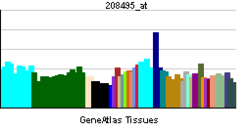TLX3
| TLX3 | ||||||
|---|---|---|---|---|---|---|
| Identifiers | ||||||
| Aliases | TLX3, HOX11L2, RNX, T-cell leukemia homeobox 3 | |||||
| External IDs | MGI: 1351209 HomoloGene: 23181 GeneCards: TLX3 | |||||
| RNA expression pattern | ||||||
 | ||||||
| More reference expression data | ||||||
| Orthologs | ||||||
| Species | Human | Mouse | ||||
| Entrez | ||||||
| Ensembl | ||||||
| UniProt | ||||||
| RefSeq (mRNA) | ||||||
| RefSeq (protein) | ||||||
| Location (UCSC) | Chr 5: 171.31 – 171.31 Mb | Chr 11: 33.2 – 33.2 Mb | ||||
| PubMed search | [1] | [2] | ||||
| Wikidata | ||||||
| View/Edit Human | View/Edit Mouse |
T-cell leukemia homeobox protein 3 is a protein that in humans is encoded by the TLX3 gene.[3][4][5]
RNX (HOX11L2, TLX3) belongs to a family of orphan homeobox genes that encode DNA-binding nuclear transcription factors. Members of the HOX11 gene family are characterized by a threonine-47 replacing cytosine in the highly conserved homeodomain (Dear et al., 1993).[supplied by OMIM][5]
References
- ↑ "Human PubMed Reference:".
- ↑ "Mouse PubMed Reference:".
- ↑ Lee-Kirsch MA, Engel K, Paditz E, Rosen-Wolff A, Lee YA, Gahr M (Jul 2001). "Assignment of the human homeobox 11-like 2 gene (HOX11L2) to chromosome 5q34→q35 by radiation hybrid mapping". Cytogenet Cell Genet. 92 (3–4): 358. doi:10.1159/000056933. PMID 11435718.
- ↑ Cinti R, Fava M, Sancandi M, Matera I, Ravazzolo R, Ceccherini I (Jul 2001). "Assignment of the HOX11L2 gene to human chromosome band 5q35.1 and of its murine homolog to mouse chromosome bands 11A4-A5 by in situ hybridization". Cytogenet Cell Genet. 92 (3–4): 354–5. doi:10.1159/000056931. PMID 11435716.
- 1 2 "Entrez Gene: TLX3 T-cell leukemia homeobox 3".
Further reading
- Dear TN, Sanchez-Garcia I, Rabbitts TH (1993). "The HOX11 gene encodes a DNA-binding nuclear transcription factor belonging to a distinct family of homeobox genes". Proc. Natl. Acad. Sci. U.S.A. 90 (10): 4431–5. doi:10.1073/pnas.90.10.4431. PMC 46525
 . PMID 8099440.
. PMID 8099440. - Bernard OA, Busson-LeConiat M, Ballerini P, et al. (2002). "A new recurrent and specific cryptic translocation, t(5;14)(q35;q32), is associated with expression of the Hox11L2 gene in T acute lymphoblastic leukemia". Leukemia. 15 (10): 1495–504. doi:10.1038/sj.leu.2402249. PMID 11587205.
- Ballerini P, Blaise A, Busson-Le Coniat M, et al. (2002). "HOX11L2 expression defines a clinical subtype of pediatric T-ALL associated with poor prognosis". Blood. 100 (3): 991–7. doi:10.1182/blood-2001-11-0093. PMID 12130513.
- Matera I, Bachetti T, Cinti R, et al. (2003). "Mutational analysis of the RNX gene in congenital central hypoventilation syndrome". Am. J. Med. Genet. 113 (2): 178–82. doi:10.1002/ajmg.10746. PMID 12407709.
- Mauvieux L, Leymarie V, Helias C, et al. (2003). "High incidence of Hox11L2 expression in children with T-ALL". Leukemia. 16 (12): 2417–22. doi:10.1038/sj.leu.2402709. PMID 12454747.
- Strausberg RL, Feingold EA, Grouse LH, et al. (2003). "Generation and initial analysis of more than 15,000 full-length human and mouse cDNA sequences". Proc. Natl. Acad. Sci. U.S.A. 99 (26): 16899–903. doi:10.1073/pnas.242603899. PMC 139241
 . PMID 12477932.
. PMID 12477932. - Berger R, Dastugue N, Busson M, et al. (2003). "t(5;14)/HOX11L2-positive T-cell acute lymphoblastic leukemia. A collaborative study of the Groupe Français de Cytogénétique Hématologique (GFCH)". Leukemia. 17 (9): 1851–7. doi:10.1038/sj.leu.2403061. PMID 12970786.
- Cavé H, Suciu S, Preudhomme C, et al. (2004). "Clinical significance of HOX11L2 expression linked to t(5;14)(q35;q32), of HOX11 expression, and of SIL-TAL fusion in childhood T-cell malignancies: results of EORTC studies 58881 and 58951". Blood. 103 (2): 442–50. doi:10.1182/blood-2003-05-1495. PMID 14504110.
- Su XY, Busson M, Della Valle V, et al. (2004). "Various types of rearrangements target TLX3 locus in T-cell acute lymphoblastic leukemia". Genes Chromosomes Cancer. 41 (3): 243–9. doi:10.1002/gcc.20088. PMID 15334547.
- Gerhard DS, Wagner L, Feingold EA, et al. (2004). "The status, quality, and expansion of the NIH full-length cDNA project: the Mammalian Gene Collection (MGC)". Genome Res. 14 (10B): 2121–7. doi:10.1101/gr.2596504. PMC 528928
 . PMID 15489334.
. PMID 15489334. - Ballerini P, Busson M, Fasola S, et al. (2005). "NUP214-ABL1 amplification in t(5;14)/HOX11L2-positive ALL present with several forms and may have a prognostic significance". Leukemia. 19 (3): 468–70. doi:10.1038/sj.leu.2403654. PMID 15674415.
- Gottardo NG, Jacoby PA, Sather HN, et al. (2005). "Significance of HOX11L2/TLX3 expression in children with T-cell acute lymphoblastic leukemia treated on Children's Cancer Group protocols". Leukemia. 19 (9): 1705–8. doi:10.1038/sj.leu.2403834. PMID 15990867.
- Borghini S, Vargiolu M, Di Duca M, et al. (2006). "Nuclear factor Y drives basal transcription of the human TLX3, a gene overexpressed in T-cell acute lymphocytic leukemia". Mol. Cancer Res. 4 (9): 635–43. doi:10.1158/1541-7786.MCR-05-0250. PMID 16966433.
- Nagel S, Scherr M, Kel A, et al. (2007). "Activation of TLX3 and NKX2-5 in t(5;14)(q35;q32) T-cell acute lymphoblastic leukemia by remote 3'-BCL11B enhancers and coregulation by PU.1 and HMGA1". Cancer Res. 67 (4): 1461–71. doi:10.1158/0008-5472.CAN-06-2615. PMID 17308084.
This article is issued from Wikipedia - version of the 6/3/2016. The text is available under the Creative Commons Attribution/Share Alike but additional terms may apply for the media files.